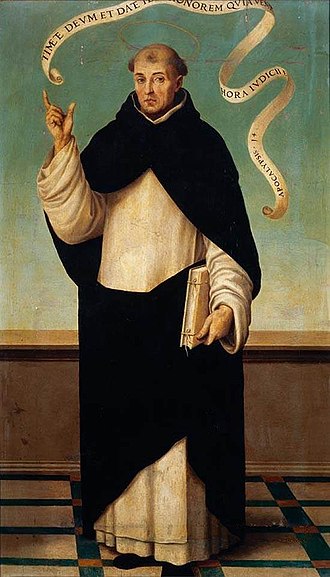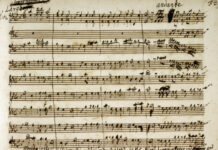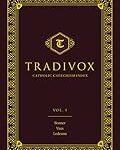Saint Vincent Ferrer (+1419), whose commemoration is on this April 5th, was a fiery, intense, highly intelligent Dominican missionary, who travelled the length and breadth of Europe preaching to and converting untold thousands, counselling kings and potentates, and embroiled in the controversies of the day.
When he was born, his mother experienced no pain, and foresaw that he would somehow do great things for God. He was named him after the early martyr, Vincent the Deacon, whose sufferings during his own ordeal became the stuff of legend. Vincent joined the Dominican Order as a young man, and was tempted to leave, but persevered by prayer and penance, knowing the path to which he had been led was God’s holy and perfect will.
Blessed with a strong and resonant voice, Vincent became one of the greatest preachers of his day, gathering thousands, in open fields, up and down Spain, Italy and Europe, converting untold numbers. He was known for this clear and to-the-point words, directed to the heart of his hearers:
In sermons and talks, use simple language and a homely conversational style to explain each particular point. As far as you can, give plenty of examples; then, whoever has committed that particular sin will have his conscience pricked, as though you were preaching to him alone.
Rather than general, vague ambiguities, state the truth boldly:
Such a style usually has a good effect on a congregation. For to speak of virtues and vices in general terms evokes little response from listeners.
And the same with his advice in the sacrament of Confession:
whether you are gently comforting the timid, or more sternly putting the fear of God into the hardened sinner, you must always show the deepest love, so that the sinner always feels that your words come out of pure love.
Stories of his ‘anti-semitism’ seem exaggerated, as he is also known to have protected the people of the Old Covenant, who were persecuted in those fractious times. His main goal was to offer everyone the means towards heaven, by the Way, the Truth and the Life, and to see Christ’s salvific words spread far and wide. He differed with Saint Catherine of Siena on who was the ‘real’ Pope during the Great Western Schism, wherein there were at one point three rival claimants to the papacy, but he, and Catherine, always upheld the universal truth of the office of the Vicar of Christ, and that someone was the real pope.
I recall reading, years ago, that Vincent claimed that Confirmation would in a later age be given improperly. One might pause and ponder these words of Bishop Joseph Aquila from 2011, currently of Colorado, on the proper age and order of the sacraments of initiation, about which we will say more anon.
There was not much ambiguity in Vincent’s preaching. Like all great saints, his apostolic work was the fruit of a deep interior life, and one fact that struck me was that during his formation, he spent three years reading nothing but the Bible, committing the entire Word of God to memory. (See our post on the deleterious effects of the Internet) Would that we had but a spark of the fire that must have burned within Vincent, perhaps we too might set the world ablaze.
Saint Vincent Ferrer, ora pro nobis! +












